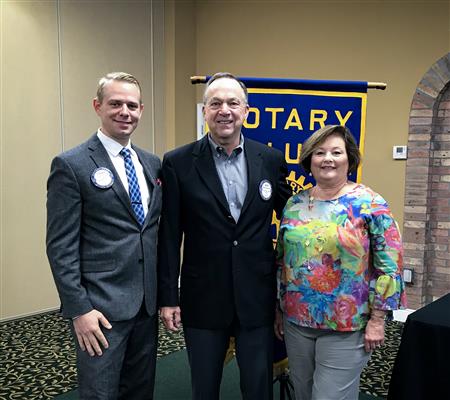President-Elect Steven Utroska presided over today’s meeting for President Jamey Mitchell. Steve Ramp gave today’s invocation. Michaela Harper led us in the Pledge of Allegiance. Thanks to Steven Utroska who served as our greeter today.
Brandon Hodges thanked those who helped with today’s meeting and then introduced today’s guests. Mike McPhail has Joe Bost, a prospective member, as his guest today. Mark Killingsworth has his wife Rheba as his guest today.
Steven reminded members that Fresh Fruit Gift Baskets orders must be finalized by November 27th.
Erin Granberry then introduced today’s guest speakers, Mark and Rheba Killingsworth. Mark is retired from the retail industry. Rheba was a stock trader for both Liberty Bank in Oklahoma City and Stephen’s Inc. in Little Rock Arkansas. After the birth of their second daughter in 1987 Rheba became CEO of the Killingsworth household.
They have two daughters, Lindsey and Meredith. Lindsey graduated from USM and works for Hattiesburg Clinic. Meredith has been a heroin addict for 14 years. Her son Jaden was born in 2008. Shortly after that, she resumed her addiction. Rheba and Mark raised Jaden from birth, became his legal guardian at six months and eventually adopted him in 2011 at the age of three. They spoke to our club today to share their story.
Opium was derived from the Poppy Plant in 3,400 B.C. Civil War soldiers were hooked on morphine being used on the battlefield. Their addiction was labeled as the “Disease of Soldiers.” Because of the growing number of heroin addictions, Congress passed the Heroin Act making it illegal for use in 1924.
In 1980 Dr. Hershel Jick in the New England Journal stated, “use of narcotics rarely leads to addition in patients.” An opioid pill called OxyCotin was developed in 1995 and it went on the U.S. market as a pain killer in 1996. In two years, prescription sales went from 2 million to 11 million.
Finally, in 2016 Dr. Tom Friedan, Director of the CDC stated that, “We know of no other medication routinely used for a nonfatal condition that kills so many patients so frequently.”
These drugs are extremely addictive. Twenty percent of the population has the brain chemistry to become addicted with just one dose. By activating opioid receptors artificially, users have their reward system rewired. The brain stops producing Dopamine. The brain is then hijacked, and the user loses control over their addiction. It is estimated that drug addiction costs the U.S. economy about $78 billion annually.
Of the 80,000 U.S. drug deaths in 2017, more than 72,000 are caused by overdoses. The addict is chasing the high they got when they first began using the drug. They will never be able to achieve success.
Symptoms to look for with addiction are isolation, irritability, weight loss, skin tone changes, sweating and sleeping a lot, not eating or binge eating, pin-dot eyes, sores and bruises on the skin, paranoia, new or strange friends, lying or denying, sudden bursts of energy at odd hours.
Meredith has served four years in a state prison, gone through rehab (which is only about 30% effective), gone through several cars and apartments, and is now living partially homeless.
Mark and Rheba talked about living with the Three C’s of addiction. You have to understand that you did not cause it, you cannot control it and you cannot cure it.
They recommend a book by Johann Hari called Chasing the Scream. "A compassionate and humane argument to overturn draconian drug policies.” If you need help, would like more information or if you’d like Mark and Rheba to share their story with other groups, email Mark at markk1951@gmail.com.
Steven thanked today’s speaker and adjourned the meeting with your motto, service above self.
